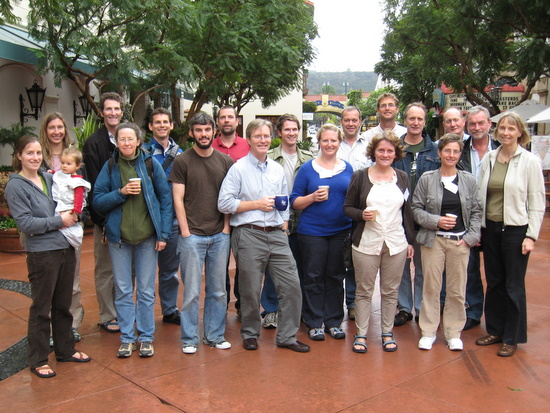NCEAS Working Groups
Long-term phenological changes in tundra plants in response to experimental warming and observed changes in climate
Project Description
Arctic regions are predicted to undergo strong warming in response to increasing concentrations of atmospheric greenhouse gases, and they have already undergone measurable warming within recent decades. To directly measure the ways in which tundra plants and communities respond to consistent, low-level increases in temperature across the tundra biome, a coordinated international experiment on the effects of warming on individual tundra species and plant communities, the International Tundra Experiment (ITEX), was initiated in 1990. The experiment is centered around a small-scale passive-warming treatment using open top chambers that increase temperatures about 2 °C during the short growing season. The ITEX experiment and others have shown that tundra systems are clearly capable of responding to climate warming fairly rapidly, and these changes will have significant impacts regionally and globally.
One aspect of tundra plants that is highly sensitive to slight changes in temperature is phenology, the timing of key life-history events such as bud burst, leaf growth, flowering etc. In highly seasonal environments, such as the Arctic, timing key phenological events with the appropriate climate is essential for plant success. Plants whose phenology is regulated by unchanging internal factors or daylength will be unable to respond to changes in season length and will be replaced by species responding to other cues. The ITEX phenology, growth and community data analyzed to date show responses that in many ways mirror patterns seen along latitudinal temperature gradients. However, changes are too subtle and too variable to be detected by most individual-site studies, some after more than a decade of warming.
ITEX as an observing network provides a unique opportunity to evaluate plant phenology changes at a global scale across the tundra biome. In this working group we will evaluate changes in plant phenology across the tundra biome over the past 10-15 years in two ways: 1) comparing ambient-temperature plots versus plots subject to long-term experimental warming, and 2) comparing measurements of ambient-temperature plots taken during the mid 1990's International Polar Year. The aim of these analyses is to help us answer one of the driving questions of arctic biology in the face of climate warming, "What form will new arctic plant communities take and what are the processes driving these changes?"

Principal Investigator(s)
Steven Oberbauer, Tiffany Troxler
Project Dates
Start: October 12, 2009
End: October 16, 2009
completed
Participants
- Robert Baxter
- Durham University
- Syndonia Bret-Harte
- University of Alaska
- Mark Burgman
- University of Melbourne
- Elisabeth Cooper
- University Centre in Svalbard
- Sarah C. Elmendorf
- University of British Columbia
- Anna Maria Fosaa
- Faroese Museum of Natural History
- Greg H.R. Henry
- University of British Columbia
- Annika Hofgaard
- Norwegian Institute for Water Research
- Robert D. Hollister
- Grand Valley State University
- Frith Jarrad
- Queenland University of Technology
- Ingibjörg Svala Jónsdóttir
- University of Iceland
- Kari Klanderud
- Norwegian University of Life Sciences
- Julia A. Klein
- Colorado State University
- Esther Levesque
- University of Toronto, Mississauga
- Ulf Molau
- Göteborgs Universitet/University of Gothenburg
- Steven Oberbauer
- Florida International University
- Christian Rixen
- Swiss Federal Institute for Forest, Snow and Research (WSL)
- Adrian V. Rocha
- Marine Biological Laboratory
- Edward A.G. Schuur
- University of California, Santa Barbara
- Gaius R. Shaver
- Marine Biological Laboratory
- Robert T. Slider
- Florida International University
- Ørjan Totland
- Norwegian University of Life Sciences
- Tiffany Troxler
- Florida International University
- Carl Henrik A. Wahren
- La Trobe University
- Jeffrey M. Welker
- University of Alaska, Anchorage
Products
-
Journal Article / 2013
Phenological response of tundra plants to background climate variation tested using the International Tundra Experiment
